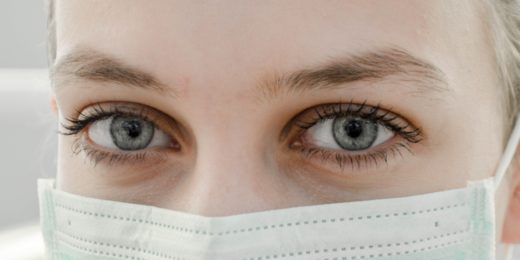The COVID-19 pandemic has taken a significant toll on our mental health, with many Americans feeling anxious, depressed and hopeless about what is to come. This is especially true for those working in health care, who are continually inundated by the traumas of the pandemic.
To better understand the psychological consequences of the pandemic on health care workers, Stanford Medicine clinical psychologist and postdoctoral fellow Sarah Hagerty, PhD, and Leanne Williams, PhD, director of the Stanford Center for Precision Mental Health and Wellness, surveyed 1,122 health care workers from across the United States early in the pandemic.
They discovered that respondents had elevated levels of post-traumatic stress disorder, and 15.4% had contemplated suicide in the time period just before the survey -- a prevalence that's roughly three times higher than seen in the general population. Additionally, the pandemic is threatening the basic human needs of health care workers, including safety and security.
Though the research was done between May and August of 2020, Hagerty suspects that health care workers who participate in follow-up research will show the same or even higher levels of trauma, stress and insecurity.
I spoke with Hagerty about what the research reveals, the mental state of health care workers and how the industry can help moving forward. The paper was published Jan. 10 in Clinical Psychological Science.
Many studies have shown that the COVID-19 pandemic is detrimental to individuals' mental health. Why is it important to dig into this issue with regard to health care workers?
At this point, all of us probably know somebody who has contracted COVID-19 or become severely ill or died from the disease. But many health care workers have confronted that all day, every day for the past two years. So, it's a chronic, ever-present stressor. Their experience is going to be different from the general public because of the intensity of their work with COVID-19 patients and beleaguered coworkers. This felt really important to capture.
How has the year and a half of continued COVID-19 cases following this study further impacted health care workers?
I'm following this study up with a second phase of data collection, so we'll get to observe what's going on with health care workers now. What I would say, given what I know about how humans both psychologically and biologically react to chronic stress, is that all of these findings will hold true and be more exaggerated.
When this study was initially collected, we were looking at an acute stressor that was novel. Nobody in modern era had experienced a pandemic at this scale that interrupted our lives in this way.
During the past year and a half, it's the chronicity piece that I think has probably taken a huge toll. Because chronic stress, we know, just does different kinds of things to people -- we tend to see things like a reduced interest in things they once found enjoyable and stress turning into depression.
Are you concerned that Omicron has pushed health providers to capacity?
It feels like this is really pushing everybody to the brink. Health care workers are perceived to have this hero quality to them -- that they always have extra capacity, they always have another reservoir after it looks like they're pushed to the brink.
What we're seeing now, based on anecdotal reports from frontline clinicians, is that they actually don't. They're human and they really can't do it anymore.
I'm concerned about what we're going to find when we check back in on health workers' experiences and how difficult it is for them in terms of depression, trauma and serious thoughts of suicide, as well as what it means for all of us who rely on the health care system and personnel.
What should be done to protect people in the health care industry moving forward?
Ideally, all of us would to do our part to mitigate how many patients are coming into the hospitals. The second piece of it is how we can mitigate the stressors health care workers experience and help manage the trauma and psychological reactions to it.
I'm working on a web-based prevention targeted towards people who have experienced trauma to make those reactions less likely. Interventions that can be rolled out to a large amount of people are needed because the traditional ways of handling this -- for example, having people go through a course of gold-standard evidence-based PTSD treatment, one-on-one with a highly skilled therapist -- aren't sufficient. We're going to need something in addition to that.
How can this study inform future research on the psychological consequences of the pandemic?
It feels natural to see the psychological consequences of the pandemic, not just for health care workers but for the population at large, through the lens of moral injury -- or a type of psychological distress or injury resulting from experiences that violate one's morals and values.
For example, as a result of high volumes of extremely ill COVID-19 patients and lack of adequate resources, health care workers might be or already have been forced to decide which patients receive critical care and which don't.
Dehumanization and betrayal, which are key facets of moral injury, are impacting a lot of the psychological consequences of folks during the pandemic. What I've been hearing from others is that they feel anger towards other people -- sometimes friends, family members, government agencies and, right now, employers. At its core, the anger probably centers on feelings of betrayal because they believe other people don't necessarily have their backs.
In dehumanization, there's a diffuse sadness and uncertainty over how to feel about the fact that almost a million Americans have died in the past couple years. I think that will have long-term psychological impact.
Photo by boyloso
Resources for mental health support
For Stanford Medicine employees, extensive mental health and wellness resources are available through the programs listed below (employee logins may be required):

- Stanford Health Care: HealthySteps mental health and well-being resources
- Stanford Children's Health: HealthySteps mental health and well-being resources
- Stanford Health Care - ValleyCare: SHC-ValleyCare resilience handbook 2022
- University HealthCare Alliance: HealthySteps
- School of Medicine: Cardinal at Work well-being resources
- Stanford University students: Vaden Health Services
Additional resources for health care workers in need of mental health support can be found below:
- American Hospital Association
- American Foundation for Suicide Prevention
- American Psychiatric Nurses Association
- Centers for Disease Control and Prevention
- National Alliance on Mental Illness
- Nurse.org
- Substance Abuse and Mental Health Services Administration
Individuals in crisis can also receive help from the Santa Clara County Suicide & Crisis Hotline at 855-278-4204. Help is available from anywhere in the United States via Crisis Text Line (text HOME to 741741) or the National Suicide Prevention Lifeline at 800-273-8255. All three services are free, confidential and available 24 hours a day, seven days a week.






